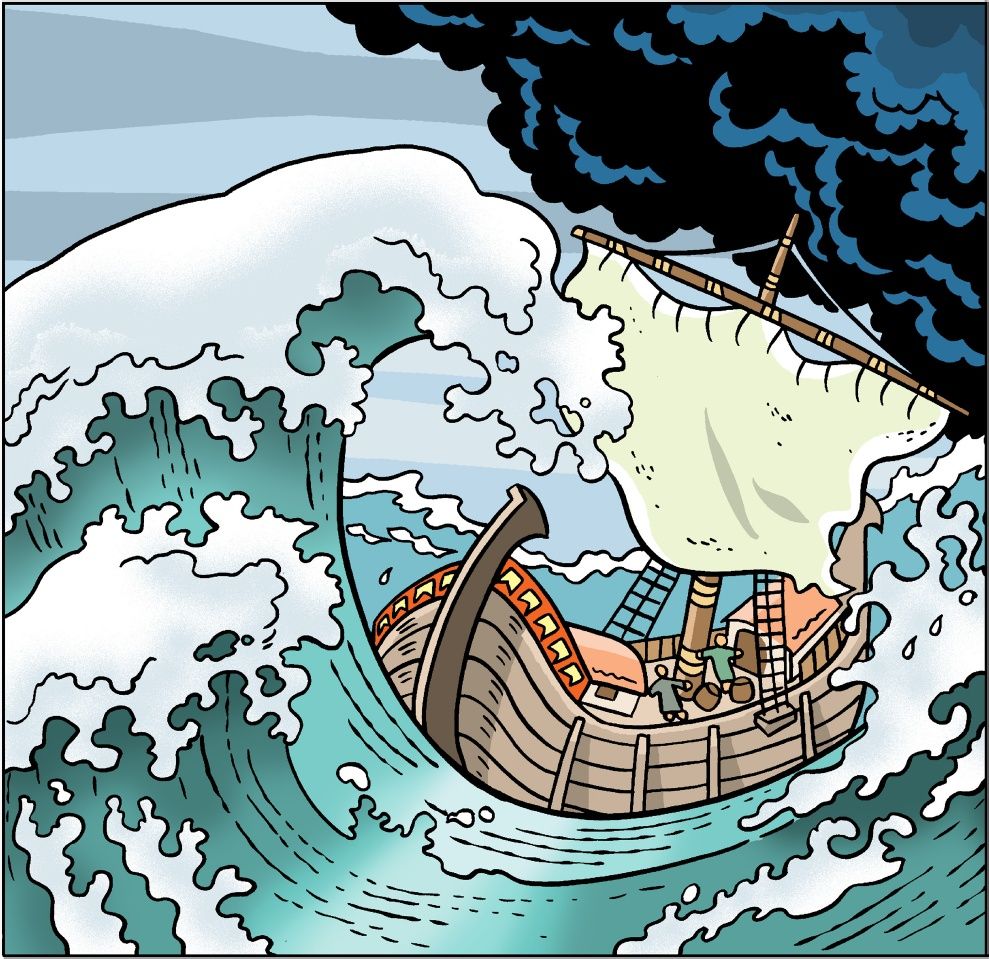Books by Ian Rogers




The following is paraphrase of Pauls Shipwreck story, for children, that I wrote based on Acts 27 from the bible.

Found this Image by Didier Martin, He has many more images like this here
by Didier Martin
About 20 years after Jesus died and rose from the dead, there was a believer called Paul. Paul taught that Jesus was God’s special person, the Messiah or the Christ, and this made other people, who did not believe in Jesus, very angry. In the end they accused him of bad things, telling tales to the Romans – who were the military police. Paul was put in prison and went through several interrogations (times of tough questioning.) Finally Paul asked to go before the Supreme Court – which was actually the Emperor of the whole Roman Empire.
Paul, along with other prisoners, was well guarded by an officer and some soldiers and put on a ship bound for Greece. The ship sailed round the coast of the Mediterranean, stopping at ports here and there like a bus on bus route. At a port called Myra Paul and his guard changed to another ship, bound for Rome. They should have sailed along the coast, going north, but the strong winds and rough seas forced them to sail south (like a bus following a diversion around road works). They were blown a long way out to sea but managed to find shelter at a port on the island of Crete.
Winter was coming on and another sea trip was risky but the ship’s owner and the navigator wanted to hop along the coast to a safer, less exposed, port. Paul spoke to the whole ship’s crew.
“I see disaster ahead if we go on; loss of cargo, even of the ship and our lives,” he told them, but Paul’s guard agreed with the owner so they set sail. No sooner were they out of the harbour than a terrific wind blew up. They couldn’t sail against it so they had to run with the wind, carried along by the storm. There was only one little lifeboat for all 276 people, being towed behind the ship. When a small island gave some shelter, the sailors pulled it on board so it wasn’t swamped by 5the waves. They also passed some ropes right under and round the ship and pulled them tight to stop the planks splitting apart. Afraid the wind would blow them clean across to Africa where they’d be wrecked on the shore, they lowered the sails and let the wind blow them any old where.
The rough weather lasted for 14 days. The waves were so bad the crew threw the cargo overboard to lighten the ship, then they threw away the rigging and spars and then anything else they could lay hands on. Nearly everyone was convinced they’d all drown but Paul eventually got everyone together.
“I told you so,” he said. “If you’d listened to me we’d still be in Fair Havens harbour – but listen now! Last night an angel from my God stood by me and told me not to be afraid. He said: ‘You will get to Rome and see the Emperor and you other prayers have been answered too. All the lives of those with you will be saved.’ So be brave. I believe it will all happen as God has told me. We will be shipwrecked but we will get ashore.”
About midnight on the 14th night the sailors sensed by the waves that we were near a shore. They took soundings, that is measured the depth of the sea with a rope, and the sea was 20 fathoms (120 feet) deep. A bit later it was only 15 fathoms (90 feet) deep. Fearing that they’d be driven ashore, maybe on rocks, in the dark the sailors threw out 4 anchors over the stern and prayed for daylight. Some of the sailors lowered the lifeboat, pretending to put an anchor out from the bow. Really they were plotting to abandon the ship and Paul knew it.
“If they’re not stopped,” he told his guard, “everyone will die,” so the soldiers pushed the sailors away, cut the ropes and let the piddling little lifeboat drift away.
As light came in the morning, Paul begged everyone to eat. “You haven’t eaten for two weeks,” he said.(Maybe everyone was too sea sick!). “Eat something now for your own good. Not even a hair of your head will perish!” Then he took bread, gave thanks to God, broke some off and ate it. Encouraged, everyone ate as well. Then all the remaining food was thrown overboard to lighten the ship even more.
In full daylight they could see a small bay in the rocky coast, with a small beach where they hoped to run the ship aground. Cutting away the anchors, they put out the rudder-oar and hoisted an improvised sail on the foremast. Heading for the bay, the ship grounded on a sand bar and stuck fast, with big waves crashing against the stern. The ship started to break up and everyone was in a flap.
“Kill the prisoners,” the soldiers told the officer, “because if they reach the shore, they’ll escape.” The officer didn’t want to kill Paul so he didn’t let anyone be killed. Everyone who could swim had to jump overboard and swim for their lives. Non-swimmers held on to planks and wooden bits of broken ship and had to kick hard and hope the waves would wash them ashore. As God had told Paul, everyone escaped.
<< Next Archive Previous >>